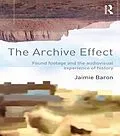The Archive Effect: Found Footage and the Audiovisual Experience of History examines the problems of representation inherent in the appropriation of archival film and video footage for historical purposes. Baron analyses the way in which the meanings of archival documents are modified when they are placed in new texts and contexts, constructing the viewer's experience of and relationship to the past they portray. Rethinking the notion of the archival document in terms of its reception and the spectatorial experiences it generates, she explores the 'archive effect' as it is produced across the genres of documentary, mockumentary, experimental, and fiction films. This engaging work discusses how, for better or for worse, the archive effect is mobilized to create new histories, alternative histories, and misreadings of history.
The book covers a multitude of contemporary cultural artefacts including fiction films like Zelig, Forrest Gump and JFK, mockumentaries such as The Blair Witch Project and Forgotten Silver, documentaries like Standard Operating Procedure and Grizzly Man, and videogames like Call of Duty: World at War. In addition, she examines the works of many experimental filmmakers including those of Péter Forgács, Adele Horne, Bill Morrison, Cheryl Dunye, and Natalie Bookchin.
Autorentext
Jaimie Baron is an Assistant Professor at the University of Alberta. Her research focuses on the production and transformation of human experience through technology. She is also the founder and director of the Festival of (In)appropriation, an annual international showcase of short, experimental found footage films.
Zusammenfassung
The Archive Effect: Found Footage and the Audiovisual Experience of History examines the problems of representation inherent in the appropriation of archival film and video footage for historical purposes. Baron analyses the way in which the meanings of archival documents are modified when they are placed in new texts and contexts, constructing the viewer's experience of and relationship to the past they portray. Rethinking the notion of the archival document in terms of its reception and the spectatorial experiences it generates, she explores the 'archive effect' as it is produced across the genres of documentary, mockumentary, experimental, and fiction films. This engaging work discusses how, for better or for worse, the archive effect is mobilized to create new histories, alternative histories, and misreadings of history.The book covers a multitude of contemporary cultural artefacts including fiction films like Zelig, Forrest Gump and JFK, mockumentaries such as The Blair Witch Project and Forgotten Silver, documentaries like Standard Operating Procedure and Grizzly Man, and videogames like Call of Duty: World at War. In addition, she examines the works of many experimental filmmakers including those of Peter Forgacs, Adele Horne, Bill Morrison, Cheryl Dunye, and Natalie Bookchin.
Inhalt
Introduction: History, the Archive, and the Appropriation of the Indexical Document Chapter 1 The Archive Effect: Appropriation and the Experience of Textual Difference Chapter 2 Archival Fabrications: Simulating, Manipulating, Misusing, and Debunking the Document Chapter 3 Archival Voyeurism: Home Mode Appropriations and the Public Spectacle of Private Life Chapter 4 The Archive Affect: The Archival Fragment, Nostalgia, and the Production of Historical "Presence" Chapter 5 The Digital Archive Effect: Historiographies and Histories for the Digital Era Conclusion: Further Directions for the Archive Effect
